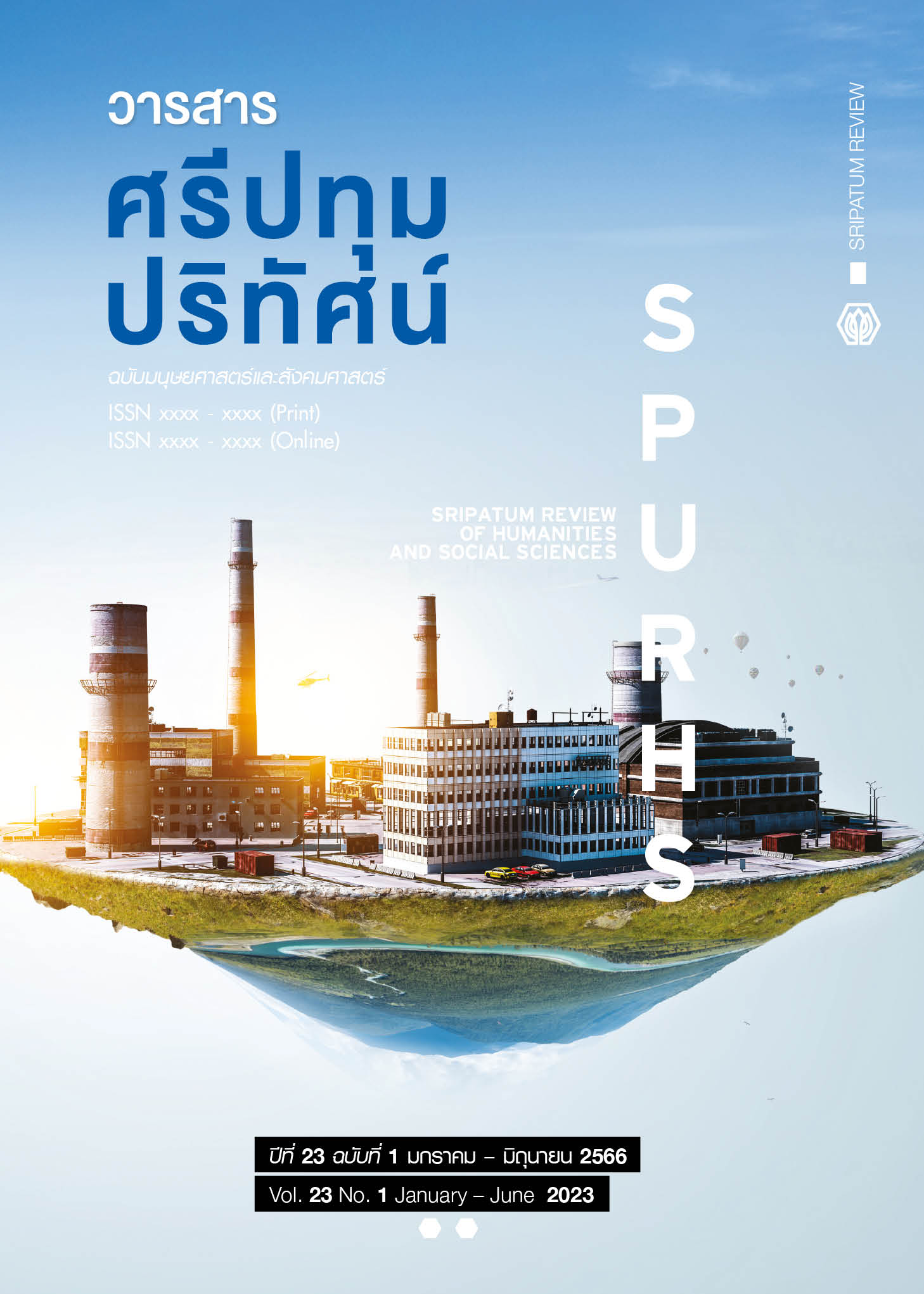Factors of E-Sports Sponsorship Predicting Spectators Brand Recall
Main Article Content
Abstract
The objectives of this research were (1) to investigate the behaviour of e-sports viewers and (2) to investigate the factors of e-sports sponsorship that predict viewers' brand recall. In this study is quantitative research, a questionnaire was used to collect data from a sample group of 424 spectators of e-sports game in Thailand, using the convenience sampling method. The statistics used in the data analysis were percentage, frequency, mean and linear regression analysis. The results show that most of the respondents are male, 20 - 25 years old. Most of them spend an average of 1 - 2 hours per week watching e-sports games and watch 2-3 times per day. The top three brands which spectators recall are Nescafe, Shopee and AISFiber respectively.
Regarding the factors predicting brand recall of e-sports sponsorship. It was found that there were four factors could be predicting brand recall of e-sport sponsors as follows:
sponsorship facilities, sponsor leagues/events/tournaments, sponsor streamers/streaming channels, and sponsor team/players with statistical significance at level .05 and has predictive power of 71.40%
Article Details

This work is licensed under a Creative Commons Attribution-NonCommercial-NoDerivatives 4.0 International License.
1. กองบรรณาธิการสงวนสิทธิ์ในการพิจารณาและตัดสินการตีพิมพ์บทความในวารสาร
2. บทความทุกเรื่องจะได้รับการตรวจสอบทางวิชาการโดยผู้ทรงคุณวุฒิ แต่ข้อความและเนื้อหาในบทความที่ตีพิมพ์เป็นความรับผิดชอบของผู้เขียนแต่เพียงผู้เดียว มิใช่ความคิดเห็นและความรับผิดชอบของมหาวิทยาลัยศรีปทุม
3. การคัดลอกอ้างอิงต้องดำเนินการตามการปฏิบัติในหมู่นักวิชาการโดยทั่วไป และสอดคล้องกับกฎหมายที่เกี่ยวข้อง
References
Abbasi, A. Z. et al. (2021). The Effects of Consumer Esports Videogame Engagement on Consumption Behaviors. Journal of Product & Brand Management, 30(8), 1194 - 1211.
Akkaranonchoowong, A. et al. (2021). A Study of the Marketing Communication Appeared in E-sports Games: A Case Study of the ROV (Arena of Valor) Game. The Proceedings of Business Conference 2021: The 8th Business transition to the new normal, 622 - 633. (in Thai)
Biscaia, R. et al. (2014). Sponsorship Effectiveness in Professional Sport: an Examination of Recall and Recognition Among Football Fans. International Journal of Sports Marketing and Sponsorship, 16(1), 7 - 23.
Boronczyk, F. et al. (2021). Game Play and the Effectiveness of Sponsor Signage: Visual Attention to Brand Messages in Live Sport Broadcasts. International Journal of Sports Marketing and Sponsorship, 23(5), 950 - 965.
Breuer, C. and Rumpf, C. (2015). The Impact of Color and Animation on Sports Viewers’ Attention to Televised Sponsorship Signage. Journal of Sport Management, 29(2), 170 – 183.
Chaiprasit and Paibulputhipong. (2013). The Impact of Sports Sponsorship on Brand Recognition of THAILAND Premier League Audiences in Bangkok Metropolitan Region. MUT Journal of Business Administration, 10(1), 23 - 39. (in Thai)
Chen, Y. C. (2021). Esports Sponsorship Effectiveness on Brand Association and Purchase Intent. MBA Master’s Thesis, Munich Business School, University of Applied Sciences.
Cochran, W.G. (1953). Sampling Techniques. New York: John Wiley & Sons, Inc.
Cornwell, T. B. (2020). Sponsorship in Marketing: Effective Partnerships in Sports, Arts and Events. 2nd Ed. London: Routledge.
European Sponsorship Association (ESA). (2022). Naming Rights Partnerships Result in 30 per cent Uptick in Brand Awareness After First Year. [Online]. Retrieved December 6, 2022, from: https://sponsorship.org/naming-rights-partnerships-result-in-30-per-cent- uptick-in-brand-awareness-after-first-year/.
Girdwichai, P. et al. (2022). Trend and Growth of E-sports After the Epidemic Situation of COVID-19: E-sports Business Trends in the Future. The Journal of Pacific Institute of Management Science (Humanities and Social Science), 8(2), 273 - 279.
Hwang, Y. et al. (2023). Effects of In-Game Brand Congruity on Esports Consumers' Implicit and Explicit Memory. International Journal of Sports Marketing and Sponsorship, 24(1), 108 - 128.
Lee, M. and Faber, R, J. (2007). Effects of Product Placement in On-Line Games on Brand Memory: A Perspective of the Limited-Capacity Model of Attention. Journal of Advertising, 36(4), 75 - 90.
Lundberg, C. A., and Smith, L. (2021). Investigation of Embedded Brand Placement within Esports. Marketing and Sponsorship, 16(1), 2 – 18.
Pulpap, S. (2016). Relationship Between Sports Sponsorship and Brand Recognition of Runners in Marathon Tournament in Thailand. Thesis of the Degree of Master of Science Program in Sports Science. Bangkok: Chulalongkorn University. (in Thai)
Saiz-Alvarez, J. M. et al. (2021). Knowledge Management in the Esports Industry: Sustainability, Continuity, and Achievement of Competitive Results. Sustainability, 13(19), 10890.
Singto, A., and Chumongkol, P. (2021). Factors Predicting the Recognition of E-Sport Sponsors of Online Gamers. Journal of Communication and Innovation NIDA, 8(1), 72 - 95. (in Thai)
The Nielson Company, LLC. (2019). Esports Playbook for Brands 2019. [Online]. Retrieved December 6, 2022, from: https://www.nielsen.com/wp-content/uploads/sites/3/2019/05/esports-playbook-for-brands-2019.pdf.


